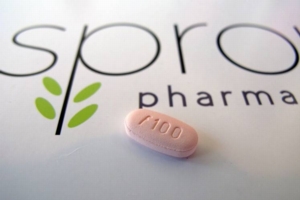Studies also show side effects including drowsiness, fainting and nausea

A tablet of flibanserin sits on a brochure for Sprout Pharmaceuticals in the company’s Raleigh, N.C., headquarters on June 22, 2015. PHOTO: ALLEN G. BREED/ASSOCIATED PRESS
The Food and Drug Administration approved on Tuesday the first pill designed to boost sexual desire in women, but studies show some serious side effects, including drowsiness, fainting and nausea.
The little pink pill, often dubbed “Viagra for women,” in clinical studies had a modest effect in boosting women’s interest in sex. But there are “serious risks” of low-blood pressure and fainting with the drug, especially when taken while drinking alcohol, an FDA analysis said.
The approval of the drug for premenopausal women, to be called Addyi, follows a lobbying campaign by the drug’s maker, Sprout Pharmaceuticals Inc., and by a group called Even the Score, partially sponsored by Sprout. In an online petition, Even the Score says the FDA “has approved 24 drugs for the treatment of male sexual dysfunction. For women, that number is zero.”
The best-known of the drugs for men, such as Viagra and Cialis, affect blood flow and men’s physical ability to have sex. Addyi, generically called flibanserin, is designed to increase sexual desire in women who are distressed by low libido.
There is considerable debate as to whether low libido in women, termed “hypoactive sexual desire disorder,” even exists as a physical condition—and if it does, whether a pill can fix it.
“I would say no and no,” said Leonore Tiefer, a clinical associate professor in the psychiatry department at New York University School of Medicine. In Dr. Tiefer’s view, the problem stems more from “hopelessness, self-critical feelings and lack of confidence.” She said that “without question,” psychiatric therapy can improve these feelings in women—and their sex drives—as much or more than Addyi.
Last fall, the FDA held a workshop focused on women’s sexual dysfunction and exactly what it is. Many women testified they had lost interest in sex and experienced difficulties in relationships as a result.
Cindy Whitehead, chief executive officer of Sprout Pharmaceuticals, noted that an FDA advisory committee voted 18-6 to approve the drug, which is taken once daily. She said the improvement in women’s symptoms with Addyi “may seem modest but it is quite significant” to the women involved. The label for the drug, which is to be launched Oct. 17 according to Sprout, states that if a woman doesn’t respond to the drug within eight weeks, she likely won’t respond at all.
A 2013 medical-journal study of 542 women on the drug and 545 women on a placebo found the main side effects were drowsiness, dizziness and nausea. Those symptoms caused 9.6% of women to discontinue the drug, compared with 3.7% of women taking a placebo.
An FDA analysis also found that women taking Addyi and hormonal contraceptives “tended to have a higher incidence of adverse events” compared with those on a contraceptive and placebo. The FDA’s analysis of the drug’s safety found “serious risks of hypotension and syncope,” meaning low blood pressure and fainting.
To measure the drug’s effectiveness, the FDA looked at users’ self-reports of “satisfying sexual events,” which initially were at a median average of about two to three a month per person. Addyi users had a median increase, compared with placebo users, of 0.5 to one such event a month, an FDA analysis found.
As to whether this conveys a perceivable benefit to those taking the drug, Cindy Pearson, executive director of the National Women’s Health Network, said women in the study had “about one more time a month where they’re happy. That’s pretty crummy.”
Written by Thomas M. Burton and published by Wall Street Journal, August 18, 2015.
FAIR USE NOTICE: This site contains copyrighted material the use of which has not always been specifically authorized by the copyright owner. We are making such material available in our efforts to advance understanding of environmental, political, human rights, economic, democracy, scientific, and social justice issues, etc. We believe this constitutes a ‘fair use’ of any such copyrighted material as provided for in section 107 of the US Copyright Law. In accordance with Title 17 U. S. C. Section 107, the material on this site is distributed without profit to those who have expressed a prior interest in receiving the included information for research and educational purposes. For more information go to: http://www. law. cornell. edu/uscode/17/107. shtml“
